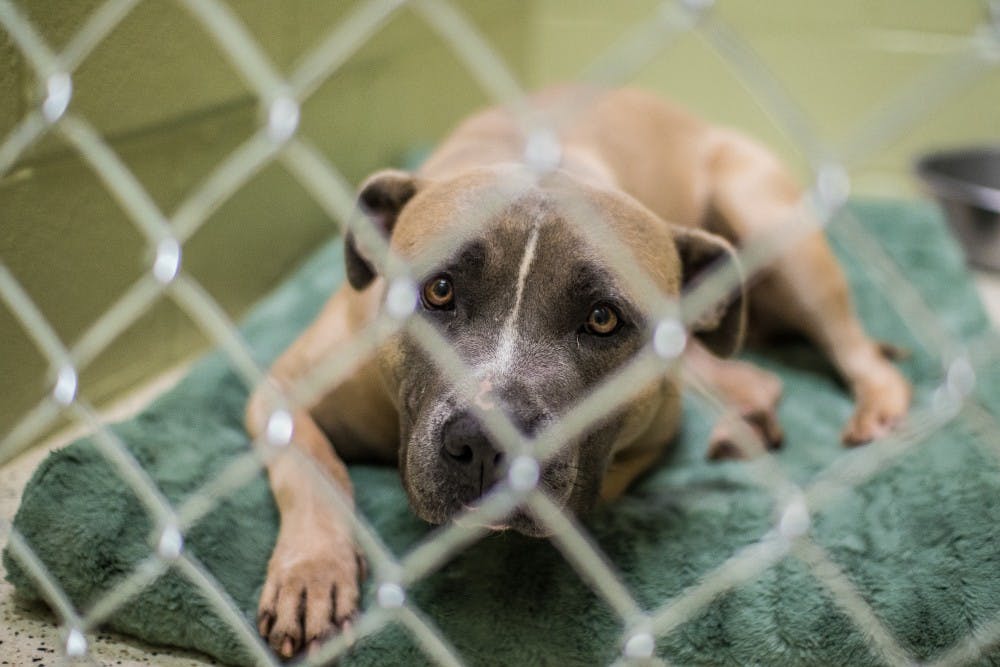The Muncie Animal Shelter is making room for new dogs, all the way from Canada.
After the Montreal pit bull ban passed — a law banning pit bills and other dangerous dogs — the local animal shelter offered to help some of the dogs in danger by making space for eight to ten dogs from Montreal animal shelters, said Muncie Animal Shelter director Phil Peckinpaugh.
“I understand what it’s like to be a shelter that needs help, and we definitely have the capacity to help here in Muncie and we truly love dogs,” Peckinpaugh said.
The breed-specific legislation passed Sept. 27 after a pit bull killed a Montreal woman four months prior. The law states that, as of Oct. 3, no new pit bulls or similar breeds can come into Montreal’s 19 boroughs, and existing pit bulls must be registered, vaccinated, sterilized and microchipped by Dec. 31 or run the risk of seizure by authorities.
After registering, pit bulls must wear muzzles when outside at all times and be kept on a leash or in an enclosure. If a dog’s owner violates the new law, the dogs could be taken away and euthanized.
“I think that the legislation that was just passed in Montreal is wrong,” Peckinpaugh said. “Actually, there’s not even a breed of dog named pit bull. That’s a categorization of a group of dogs.”
Pit bulls and similar dogs get a bad reputation because of poor ownership, not because of the inherent qualities of the dogs, Peckinpaugh said.
“Every 10 to 20 years, there’s a breed or type of dog that is kind of vilified," Peckinpaugh said. "... It’s been pit bulls since around the early to
Breed-specific legislation is not new to North America. According to the Breed Specific Legislation Census in 2016, twenty-seven states, including Indiana, enforce laws regulating how owners handle certain breeds of dogs.
Savannah Lundgren, a junior zoology and wildlife major, is the Student Voluntary Services Program Coordinator for the Muncie Animal Shelter, where she said the majority of the dogs are pit bulls. Although she does not agree with
“Pit bulls, as a breed, are known to be really aggressive," Lundgren said. "That’s just why they’re a breed — it’s what they were made for, they were made to be guard dogs. That’s why people get them in the cities. They’re good guard dogs, they’re good family pets. They have a bad reputation because they’re literally wired to protect their territory, to protect their family, to protect themselves."
Jasmine Ramos, a sophomore elementary education major, used to own a pit bull. She said she doesn't approve of the new legislation and has been upset since hearing about the ban.
“[The Montreal ban] makes me very angry,” Ramos said. "I think it’s absolutely ridiculous."
Instead of trends of aggression being the dog’s fault, Ramos said she believes irresponsible ownership is the main contributor to a history of violence in pit bulls.
“Since they’ve been trained for fighting, and still are in some places, we continue to hold this reputation of being aggressive dogs, especially because that is how they are portrayed most of the time, when in reality, it’s not the case for most of them,” Ramos said.
In Muncie, there are more pit bulls who are stray and homeless than there are of other types of dogs, Peckinpaugh said. With adoption rates and euthanasia already high in the U.S. in general, Peckinpaugh said the Muncie Animal Shelter constantly looks for volunteers to help offset these statistics.
For more information about how to help or donate, visit the shelter's website or call at 765-747-4851.





